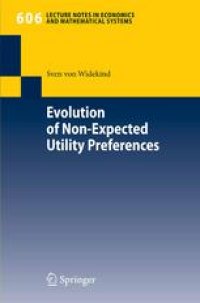
Ebook: Evolution of Non-Expected Utility Preferences
Author: Dr. Sven von Widekind (auth.)
- Genre: Mathematics
- Tags: Economic Theory, Game Theory/Mathematical Methods, Operations Research/Decision Theory, Microeconomics
- Series: Lecture Notes in Economics and Mathematical Systems 606
- Year: 2008
- Publisher: Springer-Verlag Berlin Heidelberg
- Edition: 1
- Language: English
- pdf
The theory on the evolution of preferences deals with the endogenous formation of preference relations in strategic situations. It is related to the field of evolutionary game theory. Models are based on the 'indirect evolutionary approach' according to which preferences determine choice behavior which in turn determines evolutionary success. The latter eventually governs the evolution of preferences. Literature usually considers a class of preferences which admit an expected utility representation.
In this book we analyze the role and the influence of general, possibly non-expected utility preferences in such an evolutionary setup. In particular, we demonstrate that preferences which diverge from von Neumann-Morgenstern expected utility may potentially prove to be successful under evolutionary pressures. Furthermore, we contribute to the research into existence issues for so-called stable populations. In particular, we show that such a stable population exists for any specification of the fitness values.
The theory on the evolution of preferences deals with the endogenous formation of preference relations in strategic situations. It is related to the field of evolutionary game theory. Models are based on the 'indirect evolutionary approach' according to which preferences determine choice behavior which in turn determines evolutionary success. The latter eventually governs the evolution of preferences. Literature usually considers a class of preferences which admit an expected utility representation. In this book we analyze the role and the influence of general, possibly non-expected utility preferences in such an evolutionary setup. In particular, we demonstrate that preferences which diverge from von Neumann-Morgenstern expected utility may potentially prove to be successful under evolutionary pressures. Furthermore, we contribute to the research into existence issues for so-called stable populations. In particular, we show that such a stable population exists for any specification of the fitness values.